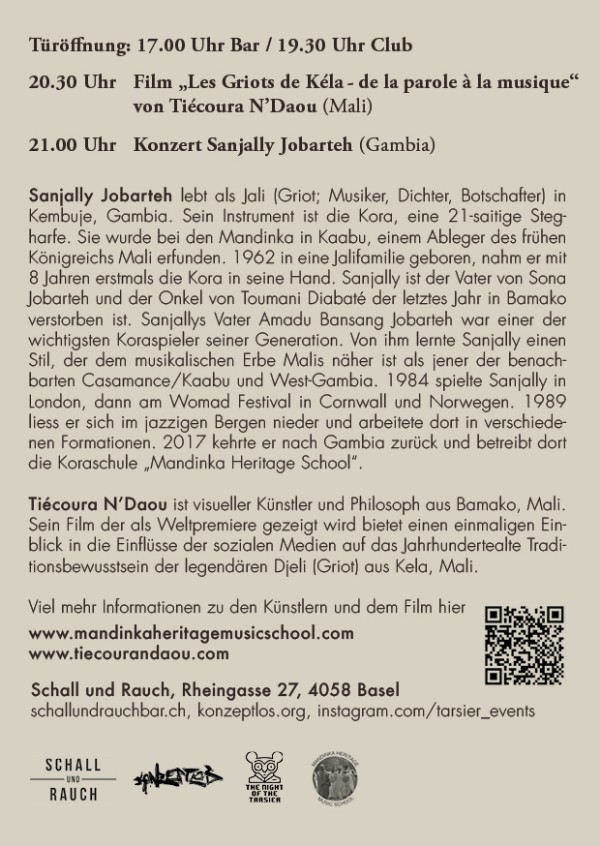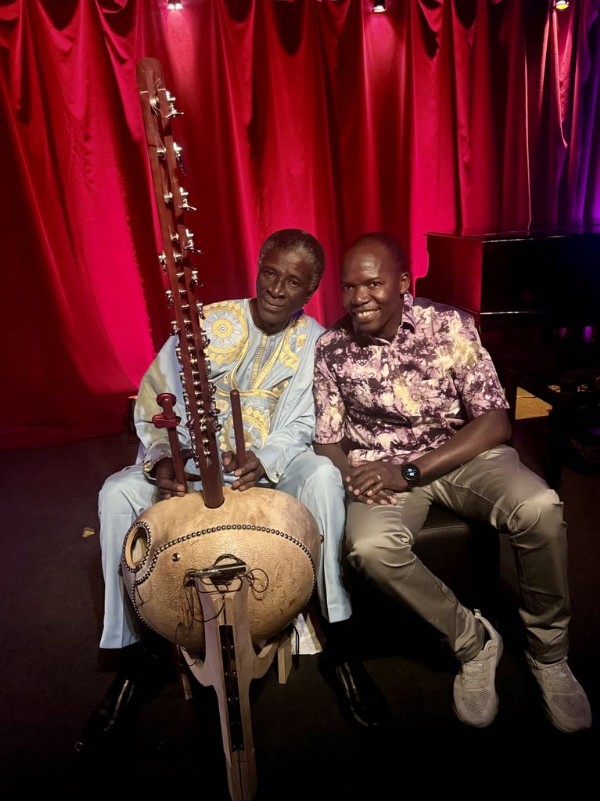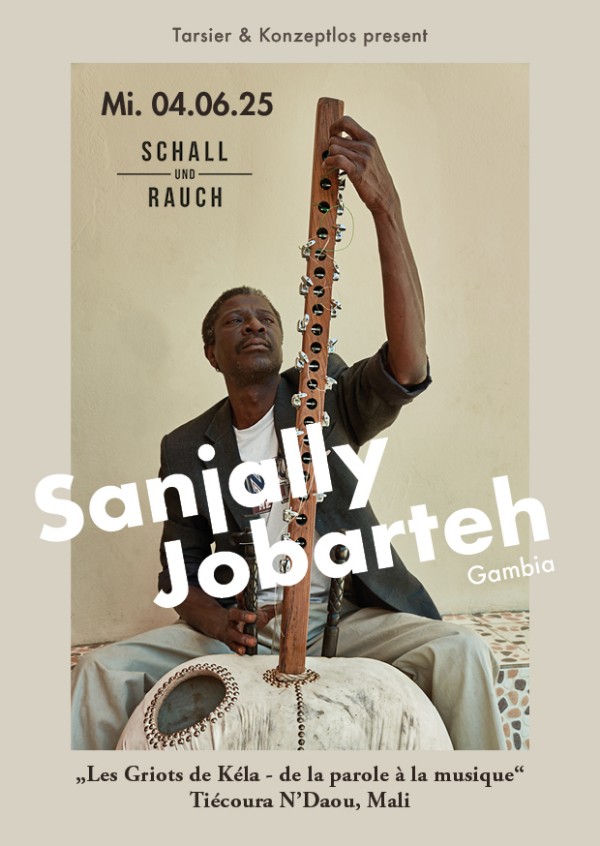
***page translated from original german to english using deepl (free version)***
Mi. 04.06.2025 Tarsier & Konzeptlos present:
SANJALLY JOBARTEH (GM)
TIÉCOURA N'DAOU (ML)
Schall und Rauch Bar (Rheingasse 27, Basel)
Door: 17Uhr Bar / 19.30 Club
Link Club-Event: Here
The collectives Tarsier and Konzeptlos join forces and present:
20.30 Film: "Les griots de Kéla - de la parole à la musique“ by Tiécoura N’Daou
21.00 Konzert: Sanjally Jobarteh
Set the mood and wind down: DJ Rainer (Konzeptlos)
Sensation: Tiécoura N'Daou is present and will present his film!!!
Sanjally Jobarteh knows the jeliya, the art of living as a jali (griot - musician, poet, mediator), since his birth in Jobartehkunda, Kembuje, in 1962. With deep musical devotion, he cultivates his roots: the kora; a 21-stringed bridge harp invented around the 17th century by the Mandinka in Kaabu, an offshoot of the early kingdom of Mali, became his instrument by choice.
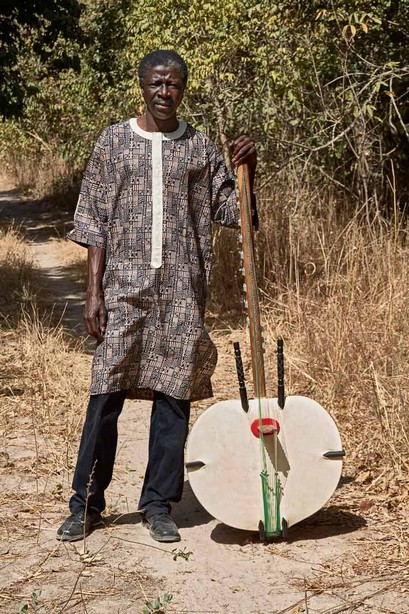
Sanjally Jobarteh's grandfather, Jali Fili Jobarteh, grew up in Gallé, south of Kita, Mali; he played the Djeli N'goni (Kontingo in Mandinka) - a 4-stringed spike lute, and settled in Tambasansang, in eastern Gambia, at the end of the 19th century. It was here that Sanjally's father, Amadu Bansang Jobarteh, learnt to play the kora and developed a playing style borrowed from the much older N'goni. Amadu developed into one of the most important kora players of his generation.
Concerts took Amadu to Europe and the USA. His style was closer to the musical heritage of Mali than that of the geographically nearer styles of the Casamance and the western part of the Gambia. Sanjallys first performances with his father followed soon; also he accompanied his mother, Aga Kumuna, from Boraba, a upriver Jali-village and stepmother Lalla Konteh at weddings and other celebrations. With his father, he travelled 1983 to London, only to accept an invitation for a 12 month-journey in London alone, one year later.
The travelling years began. Sanjally continued to deepen his experience with the kora and the music of his ancestors, close to his family. This was followed by appearances at the Womad Festival in Cornwall and later in Norway, where he settled in jazzy Bergen in 1989. Over the next few years, he worked in various formations and different musical situations, touring in Europe, without breaking off contact with his roots.
Not far from his parents' home, in 1994, he built his own house, to which he returned in 2017. These days, Sanjally Jobarteh teaches students from all over the world at his Mandika Heritage School. He is the father of Sona Jobarteh and uncle of Toumani Diabaté, who died last year in Bamako.
Tiécoura N'Daou is a visual artist (photography/film) and philosopher from Bamako, Mali. He studied at the ‘Conservatoire des Arts et Metiers
Multimedia Balla Fasseke Kouyaté’ in Bamako and is now head of the multimedia department at the university. After completing his studies, he travelled extensively, exhibited his art and was an artist in residence in many countries.
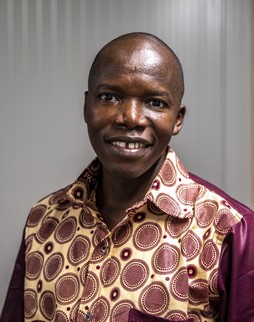
Since 2020, Tiécoura N'Daou studied philosophy at the Mont Blanc University in Chambéry. He specialises in information and communication science and the title of his dissertation is abbreviated and translated as:
‘The appropriation of new media by traditional communicators, the griots of Mali’.
As a visual artist, Tiécoura N'Daou underpinned his thesis with a film - ‘Les Griots de Kéla - de la parole à la musique’ - which we are showing today as a world premiere. Tiécoura N'Daou will be present on 04.06. to present his film himself.
Synopsis of the film
Almost 800 years ago, a kingdom emerged in Mali that gave birth to a new profession: the griot, known in Mali as the ‘Djeli’. In our words, his work consisted of the oral transmission of history and culture as a musician, praise singer, genealogist, ambassador, mediator and much more. In addition to dance, a djeli primarily uses words and music to convey information.
Since then, it has been impossible to imagine West African culture without the djeli. With their language,the ‘stylised’ recitations and classical music of a court, they still play a important role today.. Current technological developments in the media are shifting the traditional mechanisms of knowledge transfer and knowledge acquisition, even in sub-Saharan Africa. They are changing the role that the djeli played for centuries.
Kéla is a village in the south of Mali, close to the border with Guinée Conakry. It is considered one of the most important griot villages in Mali; in its Djeli school, griots from all over West Africa immerse themselves in the historical and musical traditions of the Mali kingdom with the temple guardians. Musical greats such as the late Kasse Mady Diabaté and Siramori Diabaté and her daughter Bintan Kouyaté, who is still alive, come from Kéla.
In his film ‘Les griots de Kéla - de la parole à la musique’, Tiécoura N'Daou chose Kéla's sense of tradition as the starting point for examining and depicting the influence of modern means of communication such as mobile phones, social media etc. on the traditional communicators, the Djeli.
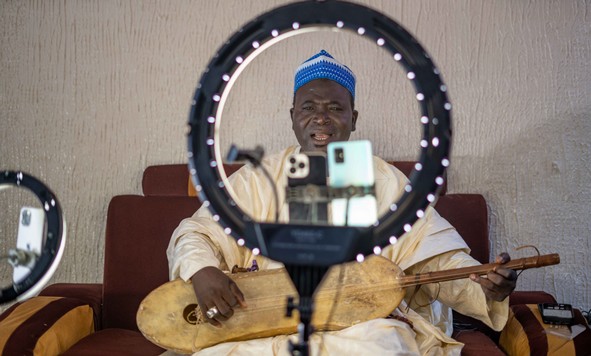
(Source: Film «Les Griots de Kéla - de la parole à la musique» by Tiécoura N’Daou)
[Text-Source: Michael Fontana; revision: Rainer W.]
Concert: Sanjally Jobarteh (Kembuje, Gambia)
Film: "Les griots de Kéla - de la parole à la musique“ von Tiécoura N’Daou (Bamako, Mali)
Support: DJ Rainer (Konzeptlos)
Flyer: Jan Hänni
Not possible without:
Michael Fontana & Peter Mätzler Koraschule-Basel
-> Thank you!
Non-public backyard concert in Basel 2024 (with Peter Mätlzer's kora, on 4 June Sanjally Jobarteh comes with his own concert-kora):
